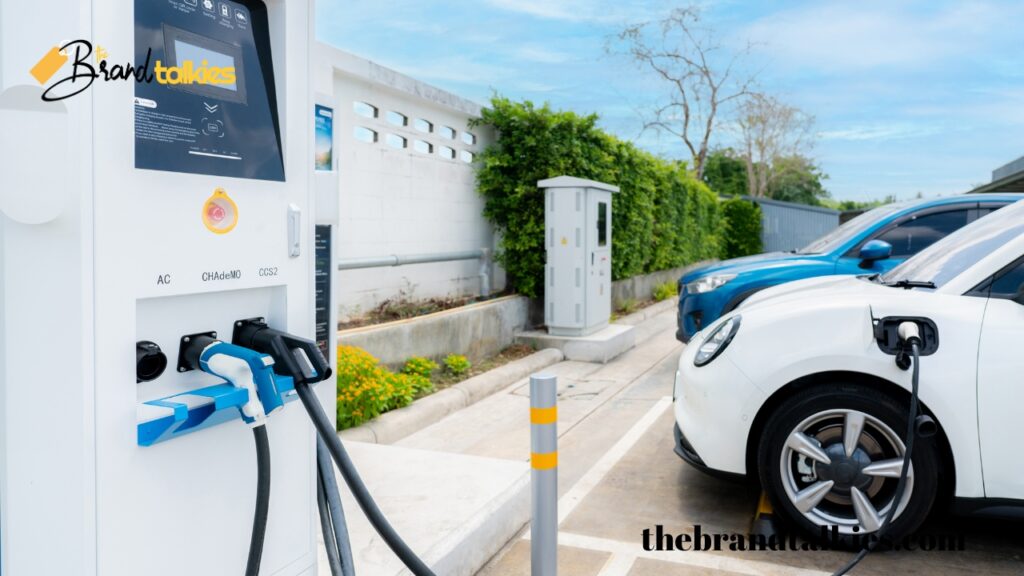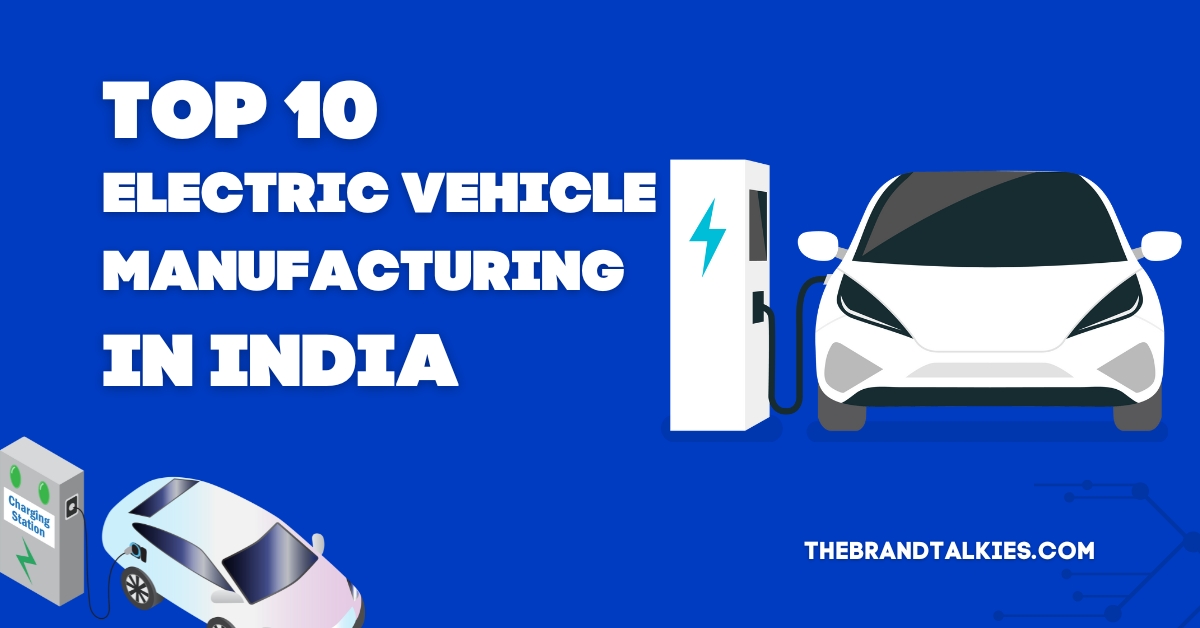As you navigate the future of transport, it’s impossible to ignore the surge in the popularity of electric vehicles (EVs). With climate change concerns dominating global discourse and a push towards cleaner energy sources, EVs are quickly becoming more than just a trend. India is no exception to this shift and has become a significant player in the EV market.
Let’s delve deeper into this buzzing sector. We’ve curated a list of India’s top 10 electric vehicle manufacturing companies, each contributing their unique innovations to transform India’s roads one EV at a time.
These trailblazers aren’t just making waves on home ground. Many have expanded globally, introducing their cutting-edge tech to markets far beyond Indian borders. So buckle up – you’re going on an electrifying journey through India’s dynamic world of EV production.

Electric Vehicle Manufacturing Industry in India
- Between FY12 and FY22 (till January), India sold 913,532 EV units, with 276,265 EVs sold in FY22.
- Uttar Pradesh emerged as the top state in EV sales between FY20 and FY22, with 145,645 units sold, followed by Delhi, Karnataka, Bihar, and Maharashtra.
- The Indian EV market size was USD 1.45 billion in 2021 and is projected to grow from USD 3.21 billion in 2022 to USD 113.99 billion by 2029.
- By 2030, the EV industry is set to create 10 million direct jobs and 50 million indirect jobs in India.
- The Indian EV financing market is projected to be worth USD 50 billion by 2030.
- As of March 2023, there were more than 2.3 million electric vehicles in India, with the majority being two and three-wheelers.
- EVs make up only about 2% of total automobile sales in India.
- The Indian government has set targets to increase EV adoption in the next decade, focusing on raising purchases of two-wheel vehicles.
- The top EV manufacturers in India include Tata Motors, JBM Auto, Olectra Greentech, Mahindra Electric Mobility, and Ola Electric Mobility.
Explore the Efficient shipping companies in India that play a crucial role in the distribution network of electric vehicles. The sustainability focus of electric vehicle manufacturers aligns with the eco-friendly initiatives of paper manufacturing companies in India.
Electric Vehicle Manufacturing Companies in India
- Tata Motors
- Hyundai
- MG (Morris Garage)
- Hero Electric
- Ola Electric
- Ather Energy
- Mahindra Electric
- Okinawa Autotech
- Ashok Leyland
- JBM Auto
| Company | Revenue (2022) |
|---|---|
| Tata Motors | ₹1,05,932 crores |
| Hyundai | ₹47,042 crores |
| MG (Morris Garage) | ₹2,982 crores |
| Hero Electric | ₹852 crores |
| Ola Electric | ₹373 crores |
| Ather Energy | ₹608 crores |
| Mahindra Electric | ₹443.88 crores |
| Okinawa Autotech | ₹800 crores |
| Ashok Leyland (2023) | ₹41,672 crores |
| JBM Auto | ₹3,193 crores |
1. Tata Motors

Tata Motors, a well-established name in India’s electric vehicle sector, has been making waves with its significant contributions to the industry. In the fourth quarter of 2022, they reported an impressive total revenue of ₹1,05,932 crore and a net profit of ₹5,408 crore.
| Q4 2021 | Q4 2022 | |
|---|---|---|
| Revenue (in Cr.) | ₹78,439 | ₹1,05,932 |
| Net Profit (in Cr.) | – | ₹5,408 |
Employing a massive workforce of 73,608 people as of 2022, this Mumbai-based company manufactures a wide array of vehicles – from cars and sports utility vehicles to trucks and defence vehicles.
Some critical clients for Tata Motors fall within the small commercial vehicle (SCV), light commercial vehicle (LCV), and medium & heavy commercial vehicle (M&HCV) segments. Their consistent performance made them the second Indian company to achieve ₹1 lakh crore in revenue in 2023. The same year also marked their entry into the exclusive ‘5-million club’ for passenger vehicle production.
They’ve partnered with Lithium Urban Technologies to roll out 5,000 electric cars and inked a memorandum with Uber to supply 25,000 electric sedans.
Tracing back its roots to 1945 when it began manufacturing commercial vehicles like trucks and buses for domestic markets. Tata’s evolution into passenger car manufacturing started with its launch of the Indica compact car in 1998.
They’re on an upward trajectory in terms of market share, rising from 13.16% in February 2022 to 13.57% in February 2023. R&D isn’t neglected either – with a whopping ₹15,339 crore allocation towards research operations during FY2022.
On the recognition front: “Car Manufacturer of the Year” at Carandbike Awards 2022 is one amongst numerous awards that adorn their trophy cabinet!
Their subsidiaries include marquees like Jaguar Land Rover, acquired from Ford back in ’08, while Lionel Messi was signed as a global brand ambassador for passenger vehicles in ’15 (though he’s not currently associated).
2. Hyundai

Cruising onto the scene, we’ve got Hyundai. You’re likely familiar with this South Korean automotive powerhouse, but let’s delve into the specifics of their Indian operations.
With a hefty profit after tax (PAT) of ₹2,861.77 crores in fiscal year 2022 – their highest in four years – and an operating revenue of ₹47,042.79 crores during the same period, Hyundai Motor India is surely revving up its financial engine.
| Fiscal Year | PAT (₹ Crore) | Operating Revenue (₹ Crore) |
|---|---|---|
| 2022 | 2861.77 | 47042.79 |
Here are some critical points about Hyundai:
- Employs around 75,000 people worldwide
- Manufactures a variety of vehicles, including passenger cars and SUVs
- Offers complimentary maintenance services for new vehicle owners
- Serves customers across 193 countries via approximately 5,000 dealerships and showrooms
Their headquarters might be nestled away in Seoul, South Korea, but their impact is felt globally.
In terms of achievements, you can’t ignore that Hyundai’s IONIQ 6 scooped up three major awards in 2022: World Car of the Year, World Car Design of the Year and World Electric Vehicle award.
Partnership-wise, they’ve been busy, too, collaborating with the Rhode Island School of Design on a project called “Sustainable Futures” in 2022.
Born out of Chung Ju-Yung’s vision back in 1967 with their first car hitting US soil in ’86, it’s safe to say they’ve come leaps and bounds since then.
Regarding market share, in 2023, they held a chunky 6.38% slice of the United States pie!
And don’t think they’re resting on their laurels either! With heavy investment into research and development focusing on urban air mobility, autonomous driving AI and robotics – your future ride could well be a game-changing Hyundai!
Not forgetting recognition from J.D Power, who named them Most Innovative Technology Experience among Mass Market Brands three years running from 20 to 22!
Subsidiary-wise, they hold a controlling stake over Kia Motors – making them both big dogs within South Korea’s automotive industry.
3. MG (Morris Garage)

Dive into the world of MG Motor, also known as Morris Garages. Established in 1920, China-based SAIC Motor Corporation acquired this British automotive brand in 2008. It made its grand entrance into the Indian market with the launch of its maiden facility in Halol, Gujarat. Today, you’ll find their corporate office nestled in Gurugram, Haryana.
Let’s look at some numbers that make MG stand out:
| Key Info | Details |
|---|---|
| Revenue and Profit | $398 million (approximately ₹2,982 crores) |
| Number of Employees | 1,346 |
| Main Products or Services | Luxury SUV cars: MG Hector, MG Astor, MG ZS EV and MG Gloster |
| Headquarters Location | Anting, Shanghai, China |
MG Motors has shown a knack for making history. They celebrated 1 million overseas sales in 2022 alone and boasted a hearty growth of 40% across Middle East markets with over 57k units sold.
Partnerships play a crucial role, too. One such alliance is with ACMA, which aims to foster skill development within India’s EV component industry.
Despite being almost a century old, the brand was founded as Morris Garages. They’ve demonstrated adaptability by evolving into an innovative frontrunner within today’s auto industry. This isn’t just limited to India; they captured about a 1% share of India’s passenger four-wheeler market in 2023.
R&D is another strong suit for them. Their collaboration with IIT Delhi – Centre for Automotive Research and Tribology (CART) showcases their commitment to advancement within the sector.
MG Motor has been showered with accolades including but not limited to ‘DrivingElectric Car of the Year’, ‘Top Gear Bargain of the Year’ and ‘Carbuyer Awards Best Family Electric Car’.
A subsidiary of Chinese-owned SAIC Motor Corporation, there are whispers about potential stake-selling discussions with Indian investors like Sajjan Jindal-led JSW Group. British actor Benedict Cumberbatch to serve as their brand ambassador
4. Hero Electric

Let’s turn our attention to Hero Electric, one of India’s leading electric vehicle manufacturers. Based at 57 Udyog Vihar IV, Sector 18, Gurugram, Haryana, this privately owned company has been electrifying the two-wheeler industry since its inception in 1993.
Hero Electric’s growth is nothing short of impressive. In FY22, the company posted an operating income of ₹841 crores, a significant leap from ₹303 crores in FY21. Furthermore, their total revenues hit the mark at ₹852 crores during the same period.
Hero Electric employs between 239 and 300 dedicated individuals who are passionate about green transport solutions.
The product line-up from Hero Electric caters to a variety of user needs. Their offerings include comfort speed models like Eddy and Atria or city speed variants such as Photon, Optima and Nyx. They’ve also introduced an electric cycle named Velocity to their range.
Their key clients aren’t just individual customers – businesses feature prominently, too! Hero Electric provides tailored fleet solutions along with IoT technology for institutional customers, offering flexible ownership options and a vast EV service network.
The company doesn’t falter when it comes to accomplishments, either. With over three lakh satisfied customers under its belt, Hero Electric sold a whopping 96,906 electric two-wheelers in 2022 alone! This feat has awarded them with a market share of around 8.9% in February 2023.
What sets them apart is their successful sales record and their partnerships that fuel innovation. Collaborations with Maxwell for battery management systems and NP Technology have enabled them to drive EV adoption among gig workers more effectively than ever before.
To meet growing demand head-on and ensure they stay ahead in technological advancements, they’ve set up an R&D centre focussing on cutting-edge innovations.
They’re not without recognition either – take the “Electric Two Wheeler of The Year” award their model Optima HX won at the Jagran Hi-tech Awards in 2020 as proof! And they bagged the coveted title of “EV Company of The Year” at the fourth IESA Industry Excellence Awards!
5. Ola Electric

If you’re looking for a leader in the Indian electric vehicle market, Ola Electric is a company that can’t be overlooked. Despite recording a consolidated loss of ₹784.15 crores in FY22, up from a loss of ₹199.23 crores in the previous year, Ola Electric’s total consolidated income soared by 329% to an impressive ₹456.26 crores. That same year, their operating revenue also hit great heights at ₹373.42 crores.
| Financial Year | Consolidated Loss (Crore) | Consolidated Income (Crore) |
|---|---|---|
| 2021 | ₹199.23 crore | N/A |
| 2022 | ₹784.15 crore | ₹456.26 |
With over 1,721 employees, it’s clear that this Bengaluru-based company has its sights set on growth and innovation across India’s EV landscape. Bhavish Aggarwal – Founder & CEO, stands tall as a key figure within the company.
You’ll find three models of electric scooters when you delve into their portfolio: the Ola S1, Ola S1 Pro, and Ola S1 Air. These aren’t just any scooters – these are vehicles capturing the attention of individual consumers across India and helping Ola Electric secure its position as India’s largest electric vehicle company by revenue and volume in 2022.
The accolades don’t stop there, though – this trendsetter sold an astonishing 1.5 lakh electric scooters in 2022 alone and holds a hefty 32% market share in India’s bustling electric scooter market.
Looking to the future with ambitious plans, Ola Electric is investing $920 million in Tamil Nadu to manufacture both electric cars and batteries for other EVs too.
When you take another peek into Ola Electric’s history books, it was founded back in 2017 as an offshoot of one of the world’s largest ride-hailing companies, Ola. From day one, it has been all about disrupting traditional mobility methods with sustainable innovations.
Always pushing boundaries, they’ve invested $500 million into setting up one of the world’s most advanced cell R&D facilities – The Battery Innovation Centre (BIC) right here at home base in Bangalore!
With funding rounds under their belt from big names like Edelweiss, Tekne Capital, Alpine Investors, Falcon Edge Capital, and SoftBank, they don’t lack recognition.
6. Ather Energy

If you’re looking for a company that’s shaking up the electric vehicle sector in India, your search might just end with Ather Energy. Founded by IIT graduates Tarun Mehta and Swapnil Jain in 2013, this Bangalore-based firm has rapidly risen to prominence thanks to its innovative designs and intelligent approach.
Known primarily for their smart electric scooters like the Ather 450X and Ather 450 Plus, they’ve carved out a significant niche for themselves. As of 2022, they held an impressive 15.5% market share nationwide in the electric two-wheeler segment. This figure soared to 21% in markets where Ather has a retail presence.
In terms of revenue, Ather generated a whopping $73 million (₹608.09 crores) last year alone! While profit figures remain under wraps due to ongoing investments into infrastructure and product enhancement, it’s clear that Ather is on an upward trajectory.
Let’s take a look at some key stats:
| Key Aspect | Details |
|---|---|
| Revenue (2022) | $73 million (₹608.09 crores) |
| Employees (2022) | 1,741 |
| Headquarters Location | Bangalore, India |
Of course, it would be remiss not to mention their achievements and partnerships as well. In 2022 alone, they delivered their 100,000th vehicle, installed the 1,000th Ather Grid across India and were crowned Two-Wheeler Manufacturer of the Year by carandbike Awards!
Here are some more noteworthy milestones:
- Principal Partner for Gujarat Titans in IPL 2022
- Partnership with Excellon Software for dealer network management
- Winning ‘Two-Wheeler Manufacturer of The Year’ award at carandbike Awards 2022
7. Mahindra Electric

Mahindra Electric, a key player in India’s electric vehicle sector, has been making waves with its innovative products and substantial market presence. It’s worth noting that the company saw its revenue from operations grow to ₹443.88 crores in FY22, more than double compared to ₹204.41 crores in FY21.
Employing 862 individuals as of 2022, the Bangalore-based firm is committed to sustainable transportation solutions and fostering a robust workforce.
Their product lineup includes the stylish e2o hatchback, the spacious eVerito sedan, and the practical eSupro commercial vehicle. Not forgetting their Treo range – low-maintenance three-wheelers powered by lithium-ion batteries. These vehicles primarily cater to personal and commercial segments.
In recognition of their efforts and execution, Mahindra Electric ended the financial year with an impressive market share of 73.4%, making them India’s leading electric three-wheeler manufacturer.
The company isn’t shy about forging strategic alliances either. In 2023, global investment firm Temasek showed faith in their vision by investing ₹1,200 crores into Mahindra Electric Automobile Ltd (MAEL), acquiring between 1.49% – 2.97% stake.
Steeped in history, Mahindra Electric Mobility Limited was initially known as Reva Electric Car Company when it was established back in 1994 before being acquired by Indian conglomerate Mahindra & Mahindra in May 2010.
Research plays an integral role at Mahindra’s Research Valley, where focus areas include innovation, customer experience and safety. The firm consistently invests in technologies related to electric vehicles, among other fields, such as autonomous vehicles and precision farming.
Their success hasn’t gone unnoticed either – they were awarded ‘EV of the Year’ for their Zor Grand DV+ model at Apollo’s annual awards ceremony held recently in 2023.
A significant development took place when Mahindra Electric Mobility Limited officially merged with its parent company Mahindra &Mahindra Limited (M&M) in 2023.
One cannot discuss this brand without mentioning Anand Mahindra – Chairman of the Mahindra Group, who has received one of India’s highest civilian honours: The Padma Bhushan.
8. Okinawa Autotech

Okinawa Autotech is making waves in the electric vehicle industry, particularly in the production of electric two-wheelers. Founded in 2015, it’s a completely Indian company that has risen to prominence due to its commitment to producing quality products and investing heavily in research and development.
In terms of financial growth, Okinawa Autotech has seen impressive strides. In FY22, they reported operating revenue of INR 800 crores, a massive jump from INR 118 crores in FY21. This seven-fold increase shows their strong market presence and demand for their products. The company’s profit also soared to INR 89.5 crores in FY22 from a mere INR 5.5 crores the previous year.
With a dedicated team of 119 employees as of 2023, Okinawa Autotech produces several models of electric two-wheelers, such as Praisepro, IPraise+, Okhi-90, Ridge+, LITE, R30, and Dual. Customers have easy access to these innovative vehicles through its extensive dealership network across India.
Their headquarters are located at Unit No. 651-654, JMD Megapolis on Sohna Road in Gurgaon, which is a hub for many tech companies in India.
One notable achievement was in October 2022, when the company doubled its sales volume, retailing up to 17,531 units. Over the whole fiscal year of 2022 alone, they sold an astonishing 1 lakh units.
Partnerships have played an integral role in Okinawa’s success story – one noteworthy collaboration being with Italian e-two-wheeler maker Tacita. Holding a robust majority stake (51%), they plan on injecting between INR 1,200-1,500 crores over the next couple of years into this joint venture – including around INR 1k crore directly into it.
This investment isn’t surprising given that Okinawa Autotech owns an impressive 17.57% market share within India’s electric two-wheeler market (as per data collected during 2022). Consistently developing new technology through their world-class Research & Development Centre based out of Europe (also part of their venture with Italy’s Tacita), they’re pushing boundaries and accelerating e-mobility growth globally!
They’ve been recognized numerous times:
- Women In Mobility Award (2022)
- Electric Two Wheeler Manufacturer of Year Consumer Award (Jan ’21)
- Their model ‘Lite’ was named Best Electric Scooter by ET (’21)
- Entrepreneur Of The Year Award (’21)
- EV Champion Of Year: Two-Wheeler (’21)
9. Ashok Leyland

With a robust track record spanning over half a century, Ashok Leyland has firmly positioned itself as a key player in India’s electric vehicle manufacturing industry.
In the first quarter of FY23, Ashok Leyland reported impressive financial figures: a net profit of ₹576.42 crores and revenue from operations amounting to ₹8,189.29 crores. The company rounded off FY23 with revenue from operations standing at a solid ₹41,672.6 crores and consolidated net profit reaching ₹1,361.66 crores.
| Profit Q1 (FY23) | Revenue Q1 (FY23) | Total Revenue (FY23) | Total Profit (FY23) |
|---|---|---|---|
| ₹576.42 cr | ₹8,189.29 cr | ₹41,672.6 cr | ₹1,361.66 cr |
Ashok Leyland boasts an employee base of 10,101 dedicated individuals who contribute their talent and skills towards sustaining the company’s growth momentum.
Offering an array of products like trucks, buses, defence vehicles, and special vehicles and engines for both Indian and overseas markets, Ashok Leyland continues to serve diverse customer needs effectively.
The brand enjoys immense trust among its clientele, including being the largest supplier of logistic vehicles to the Indian Army. From its global headquarters nestled in Chennai, Tamil Nadu, Ashok Leyland orchestrates its expansive operations throughout India and beyond.
A notable project under their belt is their collaboration with IIT Madras’ National Centre for Combustion Research & Development on hybrid electrical vehicles – further cementing their commitment towards sustainable mobility solutions.
Being part of the widely acclaimed Hinduja Group gives them additional leverage in resources and strategic direction, reflected in their steady growth trajectory over decades.
Their market share within India’s medium-to-heavy commercial vehicle segment has seen an encouraging surge by ten percentage points to reach 32% over six recent quarters.
In fact, they’ve been proactive in exploring potential acquisition opportunities, notably within China, Russia & South America across sectors like mass transit, defence vehicles, infotronics & IT services space, all while keeping R&D at the heart of everything they do!
To acknowledge exceptional contributions made by teams towards achieving organisational goals, Ashok Leyland hosts the Chairman’s Awards event annually – reinforcing their ethos around teamwork excellence.
Besides EV manufacturing, transportation companies in India are also evolving to adopt eco-friendly vehicles in their fleets.
Are There Any Electric Vehicle Manufacturing Companies Included in the Top 10 Automobile Companies in India?
Yes, electric vehicle manufacturing companies are included in the top 10 automobile companies in India. Companies like Tata Motors, Mahindra & Mahindra, and TVS Motor Company have made significant strides in the electric vehicle segment, solidifying their positions among the top 10 automobile companies in the country.
10. JBM Auto

JBM Auto, the global conglomerate JBM Group’s flagship company, has significantly impacted India’s electric vehicle manufacturing industry. With operations sprawled across multiple locations in 10 countries and a strong workforce of over 20,000 employees, it’s safe to say that they’re a force to be reckoned with.
For the fiscal year 2022, their impressive track record includes reporting total revenue of ₹3,193.05 crores along with a gross profit of ₹766.95 crores.
Their product range is diverse and innovative, from manufacturing auto components and tools to buses, including sheet metal components, assemblies and sub-assemblies, chassis and suspension systems. Not only do they offer these services, but they also provide tools and dies for turnkey projects.
It’s no wonder key automotive companies such as Tata Motors, Ford, HCIL Toyota M&M, and VECV are among their clients list.
One of their major achievements includes securing orders for approximately 5,000 electric buses. These are set to be supplied to various State Transport Undertakings (STUs) from Gujarat to Orissa, several Fortune 500 companies, and leading Indian corporates.
In their bid to expand further into the EV sector- they’ve partnered with Solaris Bus & Coach, forming JBM Solaris Electric Vehicles, which focuses solely on electric buses.
While specific market share data remains elusive, it should be noted that India ranks fourth worldwide in terms of automotive markets. This suggests an extensive market presence for JBM Auto, considering its established reputation within the industry.
They’ve proven themselves pioneers in this field through their commitment towards innovation, especially within the EV segment. This was recognized when they received the Best Innovation award under the EV Maker Category at the 8th World Auto Forum Awards in 2021 for the ECO-LIFE electric bus!
On top of all these accomplishments, it has a wholly-owned subsidiary, JBM Electric Vehicles which acquired majority stakes in both JBM Green Energy Systems and JBM EV Industries, making them indirect subsidiaries under its umbrella.
Conclusion on Electric Vehicle Manufacturing Companies in India
Electric vehicle manufacturing is an industry that’s expanding rapidly in India. Top players have emerged and are making significant strides in developing cutting-edge EV technology.
You’ve seen the top 10 companies leading this charge. From Tata Motors’ strong domestic presence to Mahindra & Mahindra’s innovative range of electric vehicles, these firms are fuelling a sustainable transportation revolution.
It’s clear from the data that electric vehicle manufacturing in India is gaining traction and making a meaningful impact on the environment and economy. The government’s push for green mobility solutions has been instrumental in driving this growth, aiming to make the country a global hub for electric vehicle production.
In conclusion, it’s safe to say that if you’re considering going electric with your next vehicle purchase, these companies should be at the top of your consideration list. They’re not just industry leaders; they’re pioneers shaping the future of transport on Indian roads.





